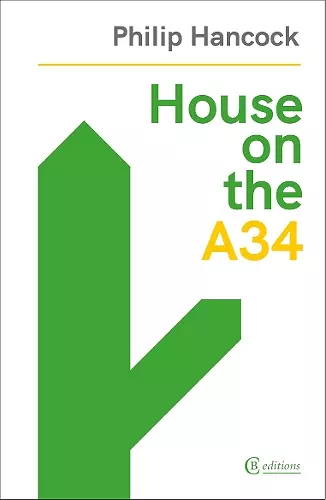House on the A34
Format:Paperback
Publisher:CB Editions
Published:12th Oct '23
Should be back in stock very soon

No skimping. In their quiet but fierce attention to the unsung and the overlooked – paint splashes, tea stains, silences – Philip Hancock’s poems reveal the histories and horizons of entire lives.
‘Time and again, Hancock’s poems succeed in finding a glint of the miraculous in the mundane, the profound in what a more facile poet might just see as the pedestrian … The great triumph of this collection is Hancock’s ability to see and relate to people many poets, politicians, managers would prefer to airbrush out of the picture.’ – Richie McCaffery, Wild Court
‘Class is an underlying presence. What anger or resentment there is behind House on the A34, however, doesn’t bleed through as it can in the work of Simon Armitage, with whom Hancock has been compared. He just shows us things as they are, and is willing to relish them; and it’s that tranquil, lyrical act of attention that is so impressive.’ – John Greening, Times Literary Supplement
‘Interspersed among the poems about work and the characters in the firm are poems about home life and school. […] But Hancock’s never really off the job. Indeed, there’s a poem called ‘Bringing the Job Home’ in which his expert eye can’t help but notice the decorative state of his own toilet door. And in ‘Autobiography’, when he looks for a metaphor for what is constant in his life or self, he finds a crack in the ceiling above his bed: “Hard to gauge any advance / on yesterday, or last year.”’ – Stephen Payne, The Friday Poem
‘In pushing beyond portrayals of work itself, these poems demonstrate a profound sense of humanity in their expressions of friendship and community … You continually get the sense that no matter the skill and effort involved, the good work of labour is like the good work of poems – never finished, only abandoned.’ – Tarn MacArthur, Poetry London
‘Philip Hancock’s poems tap a deep vein of humiliation – humiliations of place and class and aspiration, and also that thudding-in-the-ears fear of being seen. Of being rumbled, almost. It’s a fear that transcends class, but which is also so much to do with being patronised and dealing with rage . . . Some of these verses are like little parables seen in reverse – as in those paintings where there’s some big Biblical personage in the front, but ordinary household stuff going on in the background, and it’s that stuff that matters.’ – Will Eaves
‘Work is the site for thought and it’s a world of scaffolders, apprenticeships and the relief of the inside job that Hancock returns to, his unity of backdrop a means of demonstrating his style: subtle shifts of light and compressed, visual stage directions, which speak to wider concerns.’ – Declan Ryan
‘He describes the workmates, gaffers and clients of this world with its hierarchies, micro-aggressions and destructive playtime (chucking bricks at old TV screens); its pride in doing a job well and defensiveness about how it’s undervalued. The men in it can be fussy, grumpy, kind, anti-social, pettily dictatorial, and sometimes really sad. But as much attention is spent on things: the de-icer, stir stick, lump hammer, paint kettle, downspout, spindle, tenon saw, stales, cleat hooks, galvanised conduits, gimlets, awls, swivel pegs, stringboards, cable-pins …’ – Guy Russell, Tears in the Fence
‘Phil Hancock’s insights are precise and authentic – he is part of the great tradition of writers who capture the true spirit of working-class life.’ – Ken Loach
ISBN: 9781909585539
Dimensions: unknown
Weight: unknown
72 pages